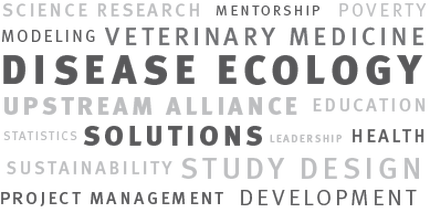In 2014, I was one of five co-principal investigators awarded a National Science Foundation grant to study the socio-economic and ecological implications of restoring prawns for schistosomiasis control in northern Senegal. Our research has shown that native prawns are voracious predators of the snails that carry the schistosome parasites in Africa. So, more prawns equals fewer snails and less risk of parasites in the water. And that translates to healthier children and communities.
ABSTRACT
Ecological damage caused by human activity can directly influence infectious diseases and human health. For example, the transmission of schistosomiasis by parasites from infected snails increased dramatically after the construction of the Diama Dam in Senegal, West Africa and many other dams around the world. About 220 million people are infected with schistosomiasis, and there are 200,000 deaths per year caused by this parasite around the world. More than 95 percent of the infections occur in Africa. Transmission occurs when people lack access to piped water and sanitation, but instead use open water systems for bathing, washing clothes and equipment, tending livestock, farming. Therefore, the disease is linked with poverty. Our project will study the socio-economic feedbacks between people, their markets and livelihoods, and the natural aquatic environment of schistosomiasis transmission. Our work aims to provide new understanding regarding the complex interaction of humans and natural forces to alter patterns of disease transmission and - at the same time - to promote sustainable development and bring people at risk of schistosomiasis out of poverty. By investigating the coupled dynamics of humans and their natural environment, we will devise and test a novel solution to this disease, relying on natural enemies of the snails that carry the parasite: prawns. We will test whether native prawn farming can synergize with proven anti-parasitic medicines to halt schistosomiasis transmission while providing protein and revenue for local communities - a win-win. We will study how to incentivize local entrepreneurs to adopt prawn farming, and how to develop a new market for prawns in rural Senegal. Our work will enhance knowledge across a range of fields, including trophic ecology, epidemiology, aquaculture, economics, and other social sciences as well as mathematical modeling. The project also will provide special educational opportunities and training for post-doctoral researchers as well as graduate and undergraduate students in the USA and Senegal. This project is supported by the NSF Dynamics of Coupled Natural and Human Systems (CNH) Program.
The project is being conducted by researchers constituting a team drawn from many different disciplines. We are conducting experiments where prawns are enclosed at water-use sites and disease transmission is compared with control sites to determine the effect of prawns on snail abundance and on human infection rates. Reintroduction of the prawns will be analyzed with economic models, consideration of human behavior, and monitoring of snail and human infections. The information from these components of the project will be synthesized with mathematical models. This project will contribute to the technology of cultivation of the prawns as part of the ecosystem recovery and augmentation of natural snail predators, and prawn-stocking and harvest strategies will be modeled to seek the best approach to maximize public health while also offering a nutritional and market incentive to sustain prawn populations.
PUBLICATIONS PRODUCED AS A RESULT OF THIS RESEARCH
Susanne H. Sokolow, Elizabeth Huttinger, Nicolas Jouanard, Michael H. Hsieh, Kevin D. Lafferty, Armand M. Kuris, Gilles Riveau, Simon Senghor, Cheikh Thiam, Alassane N'Diaye, Djibril Sarr Faye, and Giulio A. De Leo. "Reduced transmission of human schistosomiasis after restoration of a native river prawn that preys on the snail intermediate host," Proceedings of the National Academy of Sciences, 2015.

